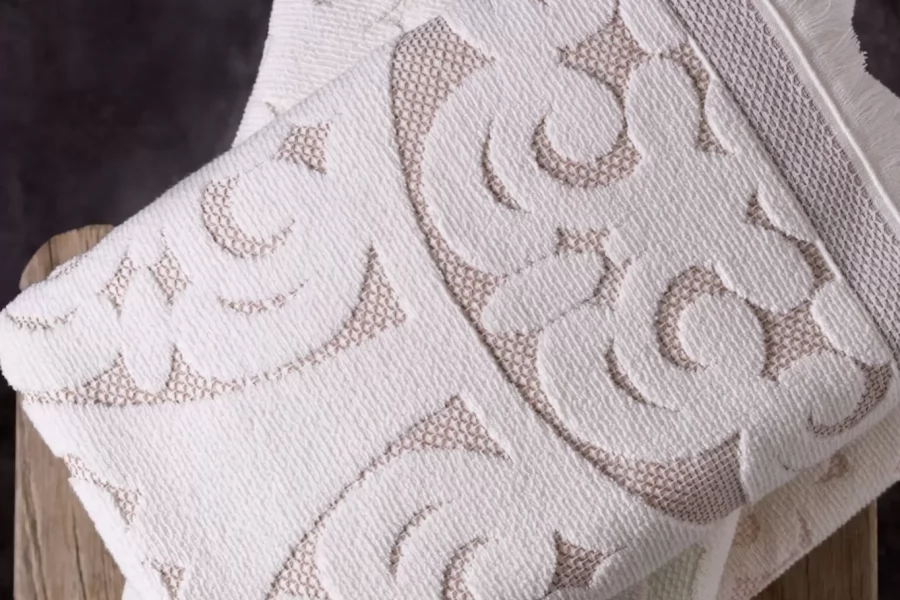What Is an Organic Towel? Discover the Sustainable Production Process
Discover the benefits of organic towels, from eco-friendly production to skin-safe comfort. Explore sustainable, chemical-free textile solutions by Selin Tekstil.
With the rise of environmental awareness and the global trend toward healthier lifestyles, organic towels have claimed a prominent place in the textile industry. What sets them apart is the origin of their raw material: cotton grown without chemical fertilizers, pesticides, or synthetic substances.
Organic cotton is cultivated using methods that preserve the natural ecosystem and support soil health. As a result, it contributes to environmental protection while offering consumers healthier, more natural textile options.
The fiber structure of organic towels is softer and more natural compared to conventional alternatives, making them particularly ideal for sensitive skin. In addition, organic towel production is designed to minimize water and energy consumption and reduce waste generation—key pillars of sustainable manufacturing.
At Selin Tekstil, we embrace this eco-conscious approach, creating high-quality organic towels that offer both comfort and environmental responsibility.
What Makes a Towel Organic?
In its simplest form, an organic towel is made from cotton grown without harmful chemicals. Organic farming methods avoid synthetic fertilizers and pesticides, relying instead on natural solutions that protect both the soil and the end consumer.
This not only improves product quality but also supports human health and ecological sustainability.
By contrast, conventional cotton farming often involves chemicals that can degrade soil and leave residues that may irritate the skin. Organic cotton, on the other hand, is naturally hypoallergenic and better suited for sensitive users.
Its breathable, soft fibers also enhance comfort and performance. Moreover, organic towel manufacturing places strong emphasis on efficient water and energy usage, responsible waste management, and minimal environmental impact.
As global awareness around sustainability grows, so too does the demand for organic towels—combining consumer well-being with eco-friendly values.
Organic vs. Conventional Towels: Key Differences
The distinction between organic and traditional towels lies in both the materials used and the production methods. These differences impact product quality, environmental footprint, and user health. Here's a breakdown of the main contrasts:
-
Raw Material Sourcing
Organic cotton is cultivated without chemical fertilizers or pesticides, making it a safer and more sustainable option. In contrast, conventional cotton often involves heavy chemical usage. - Production Practices
Organic towels undergo minimal chemical processing and are manufactured using natural methods. Traditional towels typically involve more intensive processing and chemical additives. Organic production also emphasizes water and energy efficiency. - Certification and Transparency
Organic towels are usually certified by independent organizations that ensure compliance with strict environmental and health standards. Conventional towels may lack such oversight, resulting in inconsistent quality.
These factors go beyond product durability—they reflect a commitment to both human health and planetary care. Organic towels provide a safer, more reliable choice for sensitive users and contribute positively to global sustainability efforts.
Although traditional towels may offer short-term cost advantages, the long-term environmental and health benefits of organic options are undeniable.
What Does Sustainable Towel Production Involve?
Sustainable towel manufacturing is all about minimizing environmental impact while maximizing product quality. From sourcing to final output, each phase must align with ecological and ethical standards.
The journey begins with raw materials—preferably organic cotton, grown without chemicals and in harmony with nature. This approach supports biodiversity and soil vitality.
In production facilities, water and energy use is closely monitored and optimized to prevent waste. Waste management is carefully planned to avoid pollution. In addition, fair labor practices, safe working conditions, and employee welfare are integral to the process.
All dyes and finishing chemicals used must be non-toxic, biodegradable, and harmless to both people and the planet. Sustainability isn’t just a production model—it’s a mindset that shapes a company’s entire culture and social responsibility.
At Selin Tekstil, we proudly operate within this framework, offering products that are as respectful to nature as they are luxurious to use.
Why Choose Organic Towels? The Key Benefits
Opting for organic towels offers a range of advantages that serve both your health and the planet’s well-being. Here are the top reasons to make the switch:
-
Skin-Friendly & Safe
Free from chemical residues, organic towels significantly reduce the risk of irritation or allergic reactions—ideal for babies and those with sensitive skin. - Exceptional Comfort & Breathability
Organic cotton fibers are naturally soft and breathable, improving moisture absorption and overall comfort. - Eco-Friendly Farming
No pesticides or synthetic fertilizers are used, helping preserve soil health and protect water sources. - Sustainability in Action
Production processes are designed to limit water and energy use, reduce waste, and lower carbon emissions. - Durability & Longevity
Thanks to their superior fiber quality, organic towels maintain their texture and color for longer periods—even with frequent use.
Choosing organic towels is a smart, responsible decision that promotes both personal well-being and a healthier planet. At Selin Tekstil, we’re committed to delivering these benefits through sustainable, high-quality products.
Selin Tekstil’s Sustainability Approach
At Selin Tekstil, sustainability is not just a principle—it’s a commitment. Our entire production chain is built around respect for nature and human well-being. We work exclusively with growers who produce organic cotton without chemicals, protecting soil health and ecosystem balance.
In our facilities, we implement modern technologies to minimize energy and water usage. Our waste management systems are designed to prevent environmental pollution, and we ensure that all employees work under safe and fair conditions.
Every product we make is certified according to international standards, undergoing rigorous audits and quality checks.
But for us, sustainability goes beyond environmental concerns—we also prioritize economic and social responsibility. By combining ethical production with premium quality, we aim to offer products that make a difference—for our customers and for future generations.
